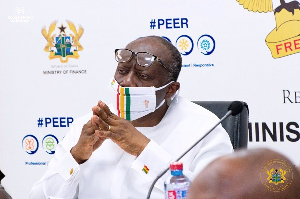 Finance Minister, Ken Ofori-Atta
Finance Minister, Ken Ofori-Atta
• Ghana’s interest costs on the international bonds market has shown to be worrying
• The nation has also recorded a debt stock of GH¢336 billion with a debt-to-GDP ratio of 76.4%
• Ghana has relied on the international bonds market to fund government expenditure
A finance lecturer at the University of Ghana Business School, Professor Lord Mensah has cautioned on the grim times ahead for Ghana’s economy.
According to him, the country increasing interest costs of international bonds on the capital market will take a huge toll on the government’s finances and liquidity in the economy.
Prof. Lord Mensah believes the situation if not addressed will ultimately deprive businesses of accessing funds to expand and develop.
“It’s going to have an impact on our economy. I mean the bonds that we’ve floated because obviously once the premium yield goes up, we should expect that every investor would require a higher rate as far as our bonds are concerned,” he told Joy Business.
“We should expect higher rates on any issue [new bonds or rollover]. It will affect the possible floatation that we’re going to do in future. Businesses will also be affected in a way because once interest rates go up in a certain environment, it increases the cost of operations. Even the banks struggle to raise funding.”
The finance lecturer further pointed that the government inability to raise funds will rather force it to engage in borrowing which will stifle businesses.
“When the government borrows in an excessive manner, it stifles businesses from accessing funds. So, obviously, it’s going to affect businesses locally.”
Already, Ghana is likely to return to the International Monetary Fund (IMF) for financial assistance should the increasing public debt stock persist, according to an Economist and Fixed Income Strategist, Neville Mandimika.
“At this point, Ghana needs to present a credible plan B on how they fund the budget in the absence of Eurobond issuance adding, do they still have access to the Eurobond market at these levels? Could they issue one at a reasonable price? The answer seems to be no.”
“In a worst-case scenario where debt is growing amid a global risk-off mood, Ghana may have to head back to the IMF,” the economist is quoted in a Bloomberg Survey.
Ghana’s current public debt stock stands at around GH¢336 billion ending July 2021. A figure that could hamper economic growth and recovery efforts.
In a recent Bloomberg survey, Ghana was shown to likely pay a higher premium should it return the issue more Eurobonds on the international capital market in 2022.
Though Ghana has often relied on Eurobond issuance to fund government expenditure, the nation’s credit-risk premium has risen to the highest since the onset of the coronavirus pandemic.
In addition, the Bloomberg survey pointed that limited access to loans from foreign entities may force the Government of Ghana to supply debt domestically. A decision that could hamper gains made by the local currency, the cedi.
Per a Bloomberg Index conducted in October 2021, Ghana’s US dollar bonds were the worst-performing instrument. The index which tracked the emerging-market hard-currency debt recorded a decline of 5.8 percent.